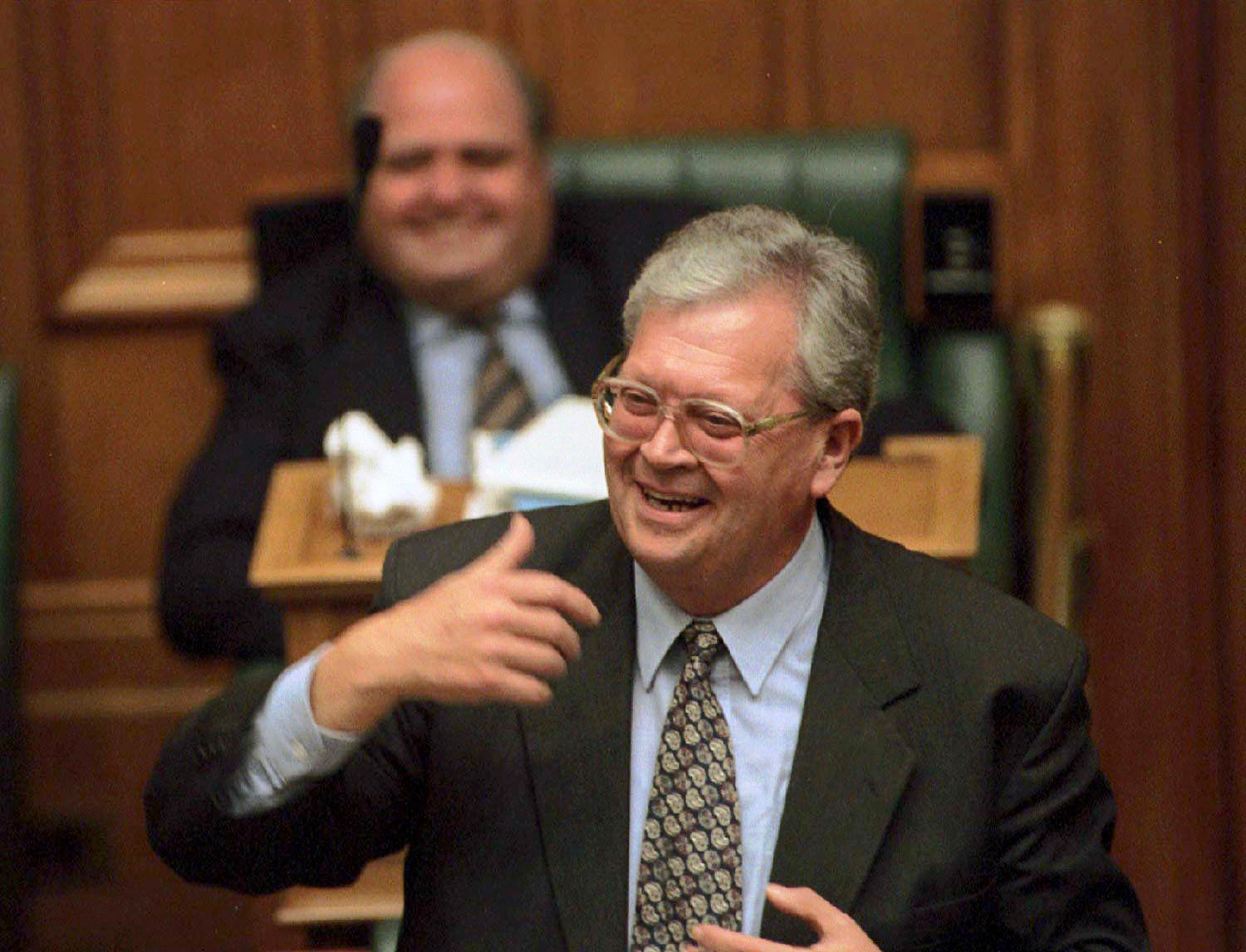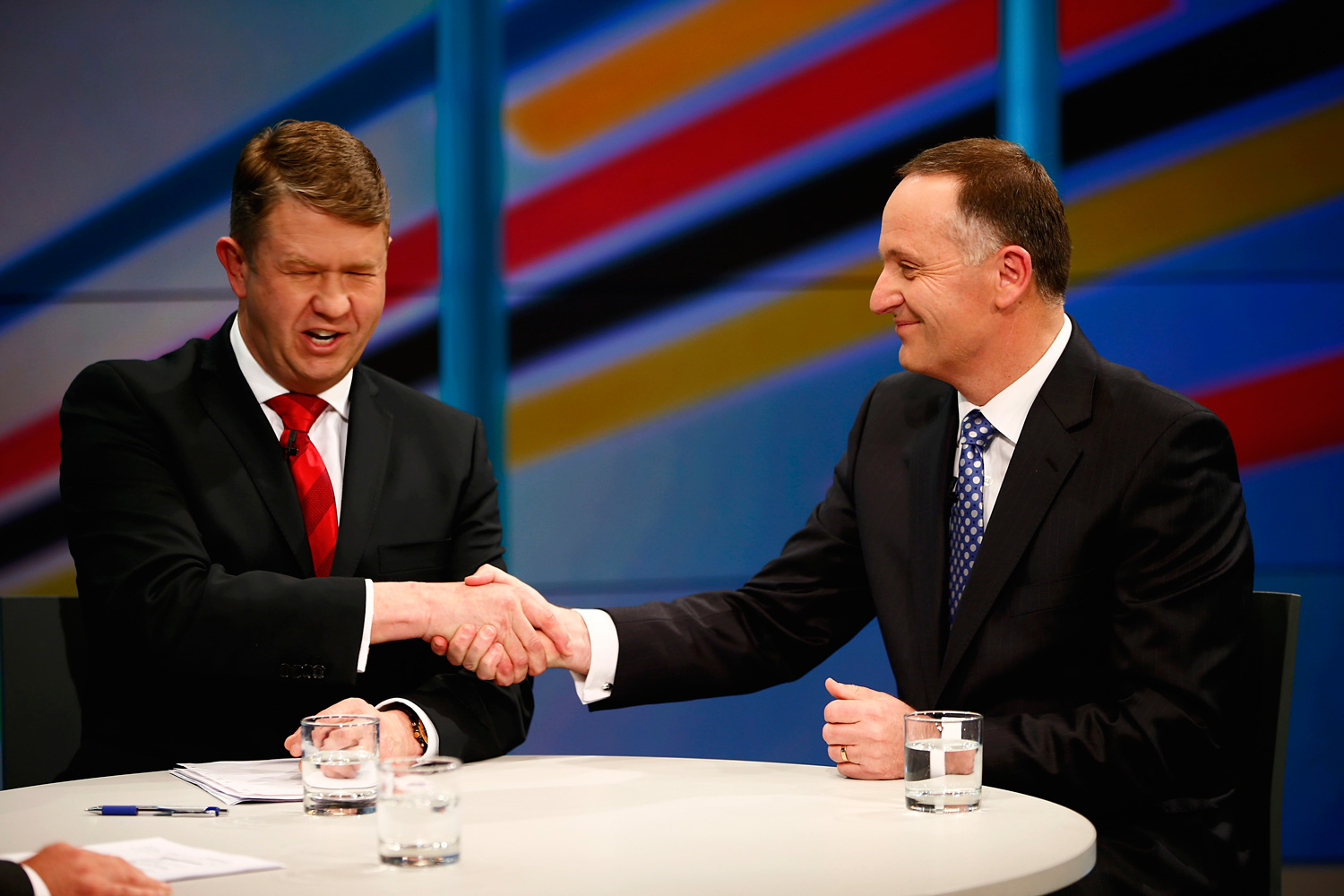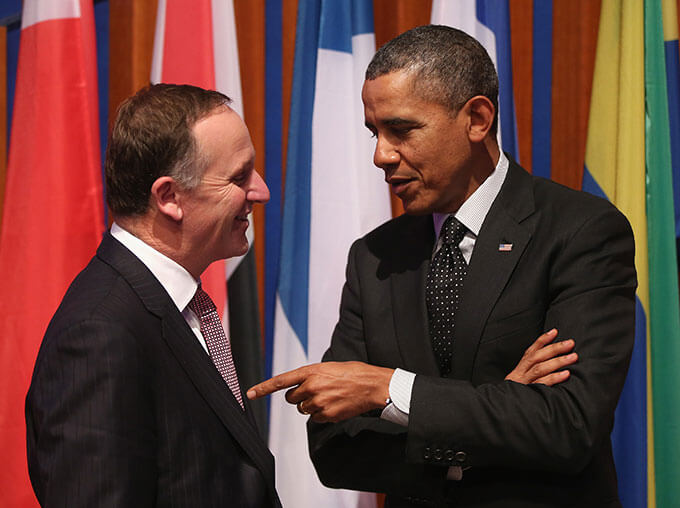Mar 15, 2016 Politics
When John Key retires from politics, he will undoubtedly be knighted. He will have ruled for several terms – possibly four – and, he did, after all, resurrect the system of royal honours that Helen Clark ditched in 2000. Some influential people will think it’s the least we can do for him for that reason alone, especially if they are looking for a knighthood themselves.
But even though the title of “Sir John” will inevitably be granted for his services to politics, it should really be for his services to acting. New Zealand hasn’t seen such a capable thespian heading our government since David Lange – one of the nation’s finest stand-up comedians – served as prime minister from 1984-89.
 Former prime minister David Lange gives his valedictory speech in parliament. Photo: Getty.
Former prime minister David Lange gives his valedictory speech in parliament. Photo: Getty.
It is Key’s long-running role as an actor playing the part of prime minister that best explains why commentators – especially those on the left – are so baffled by him. They expect him to behave like a prime minister, answer questions directly, show some consistency from day to day, week to week, month to month. Key does little of this, often preferring to improvise. He frequently contradicts earlier statements he has made, and is oblivious to inconsistencies such as restoring royal titles but then promoting a new flag in order to move on from “a colonial and post-colonial era whose time has passed”.
Key will turn on a dime if the polls show a shift against him, and without any hint of embarrassment. His position on Syrian refugees is illustrative: in September, he rejected the idea of taking more refugees; within a week, he had changed his mind and a month later was lecturing the UN on its humanitarian responsibilities towards the tide of dispossessed swamping Europe.
One of Key’s biggest advantages is that he is virtually never able to be embarrassed, even when he should be.
Some will view this as hypocrisy but, as for most actors, every day is a new day for Key and you’re only as good as your last performance. He is mostly happy to shrug his shoulders, say that “at the end of the day” he’s comfortable, and repeat a familiar line such as “Labour did it, too.” When he’s caught out, he extemporises, not infrequently saying something silly. This rarely seems to matter since one of Key’s biggest advantages is that he is virtually never able to be embarrassed, even when he should be.
In November, when asked to comment on average Auckland house prices reaching $918,000, he claimed there were more than 2000 properties on Trade Me for less than $400,000, which any serious house hunter knows is not true (unless the houses are for removal, or are leasehold with a crippling ground rent, or are small apartments).
In September, on Morning Report when Guyon Espiner pointed out that 70 per cent of respondents in a recent poll had replied “No” when asked, “Do you want to change the flag?”, Key – rather than admit his push for change had misfired – astonishingly replied that the poll question wasn’t “terribly sophisticated”.
On the BBC’s Hard Talk programme in 2011, when challenged over our environmental record and the “100% Pure New Zealand” tag being demonstrably false, Key replied: “For the most part, in comparison with the rest of the world, we are 100% pure”, provoking a guffaw from the interviewer, who pointed out 100 per cent isn’t a relative measure.
In the House, Key rarely answers a question satisfactorily, often preferring to play the larrikin. He has led the way in making Question Time an almost entirely pointless exercise. In his valedictory speech in late October, Russel Norman said it was “hard to get straight answers” at Question Time. “Let me try to be diplomatic,” he said. “It is no longer answer time and I believe that is a big problem for our democracy.”
Key is, however, much more forthcoming in mass-market entertainment venues such as radio. In mid-October, on the Hauraki Breakfast game “Thank You for Your Honesty”, he admitted to weeing in the shower and stealing stuff (but drew the line at answering whether he had “fed the chickens”, i.e. masturbated, in the past month).
Some might think that even taking part in such a puerile quiz was degrading to the office of Prime Minister but Key makes this sort of appearance a selling point, burnishing his hard-case, good-sport, bloke-at-the-barbie persona. He has said he is our “most casual” prime minister but, in fact, he isn’t a politician in the usual sense at all. (As one commentator wrote of the Radio Hauraki quiz: “I think we can safely assume there is no illusion now that the PM of NZ is actually a Prime Minister in the normal sense of the term.”)
He has more accurately been described as our “first celebrity prime minister” and, it’s true, he’s primarily a showman and entertainer.
Key gave his clearest indication of this with his gymnastics in Parliament in October 2014 when asked to explain his contact with blogger Cameron Slater. Key said he had contacted Slater as leader of the National Party, which was just one role he played among many, including that of Prime Minister, and Bronagh’s husband when he put out the cat at night. What was significant is that he sees himself as playing different roles and can switch between them as it suits.
In fact, Key’s range is wide and his acting chops impressive. He can go from being angry (shouting in Parliament that the Labour Party were backing “the rapists” over the Christmas Island detainees) to being a mincing dandy on a catwalk or snuggling up to drag queens at the Big Gay Out. Perhaps the only role not really open to him is international statesman, not least because it doesn’t chime with his bloke-next-door image.
This was never more apparent than when he was invited to Balmoral by the Queen in 2013 and was dismissed as a “galloping colonial clot” by the Daily Mail for releasing photos of her in her sitting room and blabbing about details of his weekend. But we find it endearing evidence of his boyish enthusiasm for the perks of the job. Gee, you’d be just as excited to be sitting with the head of the Commonwealth in her private quarters, wouldn’t you?
This works for Key because Central Casting has set his default position as the guy-next-door: friendly (half the population must have taken a selfie with him by now); an ordinary bloke; smart but not at all intellectual or overly articulate; very capable but not one to skite even a little bit. If we could never imagine having a beer with Helen over a barbecue, John makes it seem tantalisingly possible.
Critics complain that Key’s inner life is a cultural desert, that he’s not a thinker, and has plebeian tastes. But that’s all essential to him presenting himself as an ordinary bloke – just like you and me (even if extraordinarily wealthy).
That, of course, is Key’s most audacious, breathtaking role: playing at being one of us. His career as a currency trader and investment banker in New York and London has allowed him to own residences in London, Hawaii, Wellington and Auckland (with a $10 million pile in Parnell and a $3 million getaway at Omaha) and he is probably worth hundreds of millions. It has been said the common estimate of his wealth of $50 million was arrived at simply because it was the upper limit of what his advisers believed the electorate could accept.
The ballast to Key’s rags-to-riches story is the state house upbringing in Christchurch with his refugee Austrian mother. His ordinary-bloke persona wouldn’t work for him without it. It doesn’t seem to matter that this was a lifetime ago, and that he quickly exchanged straitened circumstances for the wealth and privilege of the world of finance (latterly at global investment giant Merrill Lynch) and as a member of the Foreign Exchange Committee of the Federal Reserve Bank of New York.
Occasionally, Key has given it away himself, as in 2005 when he mused to Metro’s Bevan Rapson about then-Finance Minister Michael Cullen having given up the opportunity to make “reasonable money” by going into politics. As Rapson noted, Cullen’s salary then was $226,000.
However, what most threatens to undermine his bloke-next-door image is his son, Max, who in July posted a video of himself and his girlfriend Amelia on a luxurious winter holiday in Hawaii with Key snr. Max also belongs to exclusive clubs whose young members make a point of flaunting their wealth and social status via extravagant parties.
And, of course, the ponytail-pulling saga briefly allowed Key’s good-guy mask to slip, revealing a persona rather more like a creepy uncle than a friendly neighbour.
The other necessary ballast to Key’s persona is the “smiling assassin” tag, given to him in his Merrill Lynch days. The notion that Key wields an iron fist in a velvet glove stops him from being seen as a buffoon, which his mangled diction, frequent bouts of amnesia and general goofiness could easily lend themselves to.
David Lange, who relentlessly patronised Muldoon, would have slaughtered Key in the House for these traits. And Key would have had a much less successful political career if he was facing an Opposition who understood they were dealing with an actor pretending to be the Prime Minister, what his weak points were and how to skewer him more successfully.
As well as having been blessed with political opponents who don’t have his measure, Key’s highly successful career as an actor has been boosted by a star-struck media, who devote much of their reports to the theatre of politics, which suits Key perfectly since he is by far the most entertaining and charismatic of the parliamentary cast on either side of the House.
Among television journalists, 3 News political editor Patrick Gower is the most obvious example, and, until his recent retirement, John Armstrong in print in the NZ Herald.
Danyl McLauchlan at blog site Dim-Post wrote on the veteran journalist’s departure: “Armstrong does not seem to have been very interested in politics as it relates to government or policy or law or economics or anything that most political actors are interested in. His columns were almost exclusively about the theatre of politics, especially Question Time. Who performed well? Who had the best lines? How artfully did the Prime Minister avoid saying anything?”
In fact, many of our commentators are effectively political theatre critics embedded in Parliament in a symbiotic system that eschews analysis of policy in favour of froth.
 Above left: In Seoul to mark the signing of the New Zealand-South Korea Free Trade Agreement last March. Key shows off his fancy footwork at a soccer clinic held by the All Whites for local students. Above right: Prime Minister David Lange lines up for the Celebrity Race at the 1987 Adelaide Formula One Grand Prix.
Above left: In Seoul to mark the signing of the New Zealand-South Korea Free Trade Agreement last March. Key shows off his fancy footwork at a soccer clinic held by the All Whites for local students. Above right: Prime Minister David Lange lines up for the Celebrity Race at the 1987 Adelaide Formula One Grand Prix.
We’ve seen this play out before, of course, with the immensely likeable and devastatingly witty Lange, who had the media eating out of his hand for years (his press conferences in the Beehive were reportedly standing room only). This meant he could easily sell Roger Douglas’s radical economic prescriptions to the electorate (or at least distract voters and journalists from assessing their likely consequences).
Lange eventually came to deeply regret the salesman’s role he played on Douglas’s behalf, but he was obviously having too much fun showboating at the time to understand exactly what he was doing, or perhaps even care. Nevertheless, he was stung by Metro columnist Bruce Jesson, whose piece Gaining the World and Losing a Soul?: The Public Tragedy of David Lange appeared in late 1987, alleging the PM did not control his own government’s policy.
North & South columnist Joe Atkinson further got under his skin in 1995 by claiming he was too lazy to do his job as prime minister properly – criticism that saw Lange sue in a long-running case that changed the defamation laws, but ultimately not to politicians’ advantage.
Increasingly, Key, like Lange, seems to most enjoy the showboating aspects of his job – such as attending glittering overseas conferences and hobnobbing with Barack Obama. And there’s nothing like international politics to give a show-off a stage on which to perform across the news cycle.
What drives Key is what drives every actor: ratings. Politicians, naturally, all care about their popularity but Key is extraordinarily devoted to measures of it; his pet pollster, David Farrar, polls constantly and Key adjusts his own position accordingly. As a tribute to his influence, Farrar was the first person Key thanked on election night 2014.
This clearly isn’t a leader who has an intuitive sense of what people think, although it is often spun that way; this is a poll-driven “reef fish”.
This clearly isn’t a leader who has an intuitive sense of what people think, although it is often spun that way; this is a poll-driven “reef fish”, as Lange once quipped. The fact Key will change position and adopt the opposition’s in a heart-beat means they are faced with a shape-shifting foe, a political chameleon.
 Like Key, former Labour leader David Cunliffe is an actor – but a far less accomplished one, who was dismissed by the public as insincere.
Like Key, former Labour leader David Cunliffe is an actor – but a far less accomplished one, who was dismissed by the public as insincere.
None of Labour’s leaders since 2008 – Phil Goff, David Shearer, David Cunliffe and Andrew Little – have been able to take on Key successfully. It’s particularly difficult for Little to compete with Key, because Little’s a politician, and a dour one at that, and not at all a showman. On the face of it, David Cunliffe should have had a much better chance of upstaging Key because Cunliffe is an actor himself, but ultimately he couldn’t compete because he was seen as insincere, which is to say his acting wasn’t very good.
As Brian Edwards wrote in early 2014: “Critics of Labour leader David Cunliffe regularly accuse him of acting, implying lack of sincerity. I rarely hear the same criticism of John Key. So is John Key more sincere than David Cunliffe? No. John Key is a better actor than David Cunliffe. With endless repetition, the role he is playing – amiable, easy-going, in charge but still just one of us – has become second nature to him and, in the process, less recognisable for what it is. Actor and real person have merged.”
In the current Parliament, only Winston Peters can begin to rival Key for showmanship, but Peters is too tricky and his allegiances too fickle for him to appeal to a majority of the electorate.
The time will inevitably come, of course, when voters want a more traditional, consistent and sober prime minister, but that time isn’t yet.
When it does come, commentators will wonder as Key disappears into the sunset towards Hawaii: “Exactly who was that man?”
The answer will come back: “Like David Lange, Sir John was the finest actor of his generation. They both made their name by successfully impersonating a prime minister.”
This article was first published in the February 2016 issue of North & South magazine.






